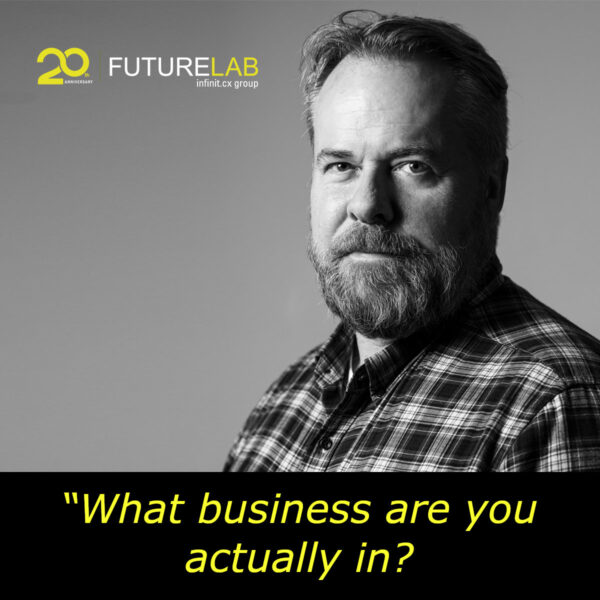by: Jason Miller
When it comes to content marketing and social media experts, Joe Pulizzi is always at the top of the list. A leading author, speaker, strategist, and founder of the Content Marketing Institute, Joe helps businesses understand the trends in content marketing, and how marketers can learn to think and act like publishers. Recently I caught up with Joe and he answered some very tough questions that content marketers face everyday.
What is the Content Marketing Institute focused on currently?
Pulizzi: I think the biggest thing in regards to the Content Marketing Industry is the fact that we don’t have to sell it as much anymore. We’re talking less about why, and more about how. This year is about how organizations scale around content, creation, and distribution. We know the social media is there – that’s great, but we’re really seeing the evolution of a marketing department really look and feel like a publishing department, and that can come with a lot of pain. Everything we’re focused on with the Content Marketing Institute is about how we educate marketers and how they can actually get CXOs on board. How are they going to measure it, integrate it and scale it?
Do you think there could be a diminishing return on content? Is there such a thing as too much content?
Pulizzi: I think there’s too much mediocre content. What we’ve been seeing in a lot of the companies that we’ve been working with is how do we get the best cutting-edge content that’s going to take the industry to the next level? We all see the five tips here and there – we see it – everybody’s doing that content. So now that everybody’s doing that content, what are you going to do to separate yourself from the pack? You’ve got to create a concept that nobody else is doing. Using tools like Google Insights to discover where the content gaps are and really figuring out the 10 to 1 storytelling strategy. For instance, here’s the story, and here’s what that is going to look like on Slideshare, Pinterest, Twitter, my E-newsletter, and in my print publication. Then, how are you going to create the team? Whether that’s the managing editor, the content creators, or your chief content officer, that’s going to help you to execute this to attract and retain customers, because that’s what it’s all about.
What are your thoughts on Pinterest and do you think it’s going to stick around?
Pulizzi: I don’t think it matters. It’s here now. I don’t try to look more than six months down the way, because you know, this is the here and now. Infographics have found a home with Pinterest. I mean we just did a post the other day – we did the history of content marketing and within a matter of two weeks we had over 600 people sharing that on Pinterest. It’s amazing how fast that has happened. So regardless of Pinterest or not, we know that there’s a home for visual storytelling. We know whether that’s through video, Slideshare, Infographics, or Pinterest, whatever the case is; you’ve got to have that part of your strategy. I don’t think textual is going away, we know how important text is, especially with search engine optimization. But you better be looking at your channel strategy and how you are telling your story through pictures. Pinterest right now is a great way to do that, especially for B2B.
What do you think are the challenges to creating compelling content and storytelling? How do you overcome those?
Pulizzi: First of all you have to focus on it like it’s part of your core business and core market. I mean we’ve never done that right? It’s always been “oh let’s get the content”. Where’s the content? Think about how websites are created and have been created. We create a website. We make it look pretty and somebody says, “Oh we need to get the content that’s going to drive people.” It’s always the last thing. What we want to see is a focus on content strategy first and how we’re thinking about what content we have. What can we repurpose? What can we imagine? What do we need? What is it going to do for our business? How are we going to measure it from a user level to a mid-level manager, director level, and to a C Level? For example, from a content marketing perspective, the C-Levels want to know three things: is it driving sales, is it saving us money, and is it keeping our customers happy? That’s all they care about. They don’t want to see analytics. You will likely need to add staff by either hiring a managing editor such as a journalist or writer with a nose for the story, or outsource to people who understand how to manage the process. These are people that you need on your team, either directly or indirectly, helping you tell your story. There’s no corporation that doesn’t have enough content. They just don’t have their content in a form that’s interesting, that’s the difference.
In your book Managing Content Marketing there is a chapter on a measuring the success of your content. What tips do you have to do so effectively?
Pulizzi: To put it simply, you need a business case for your content. Your company needs to think like a publisher, like a media company. Ask yourself the following: What is that over-arching content strategy? Where are you going to be the leading expert in the world, and how is that going to help you drive your business? I don’t see enough companies asking these basic questions. They’re asking about where we can apply content, and we’ve been doing that forever. What I recommend is to understand your buyers’ persona. What are the pain points that are keeping them up at night, and what are my marketing objectives that go with that?
Just start basic, I mean these are very basic questions, but a lot of people skip these because they’re going right to the disco ball tools of Facebook, Twitter, Pinterest, or whatever. You need content for that of course, but first you need a strategy and how it’s going to integrate with all the stuff you’re doing. Once you figure out how that strategy is going to play with your overall marketing, you need to know what your objective is going to be. Then you can figure out the channel strategy from a user level. Are you looking at sharing statistics? Are you looking at analytics, opt- in, lead scoring? At the end of the day you want to get to these three points. Is it driving more revenue? Is it saving us money? Is it keeping our customers happier? Those are the things that are most important. That’s what content will drive, and you need to use all the analytics data to help make that business case.
How does marketing automation play into content strategy?
Pulizzi: Whether you are B2C or B2B you are going to take your buyers through the buying process in some way. Most customers don’t just see a piece of content, and then raise their hand and say, oh I’m going to buy. It’s a process, especially in B2B where there are sales cycles that can be three months to twelve months, or even longer. Your goal should be to deliver the right message to the right person at the right time.
It’s not this broad area of content anymore. We know something about our user. So whether it’s a white paper that you’re creating or an e-book, how is it going to be applied differently for this person versus that person? What do you want them to do with that? You need marketing automation to make that happen. I think what we’re seeing is a lot of people getting on board with marketing automation because they know they need to, but then they need to fill that with really good content. The tools are there. What most businesses don’t have is engaging content created for those different bubbles where buyers are at in the funnel.
There is a quote from Bono in the book. Are you a fan of U2?
Pulizzi: I am a U2 fan, but that’s more my co-author Robert Rose. I think it’s appropriate though as I get pushback from B2B Marketing saying you can’t be entertaining. Storytelling is a form of entertainment and we as content marketers can learn a lot from people like Bono as well as other musicians, writers, and journalists. Content that is both informative and entertaining is what’s going to really hit home with your customers.
For more content marketing news, tips, and insights check out the Content Marketing Institute as well as Joe Pulizzi’s blog. And be sure to catch the Content Marketing World conference, the premiere international content marketing event happening September 4-6, in Columbus, OH.
Original post: http://blog.marketo.com/blog/2012/04/all-content-is-not-created-equal-a-conversation-with-joe-pulizzi.html




